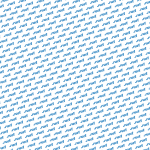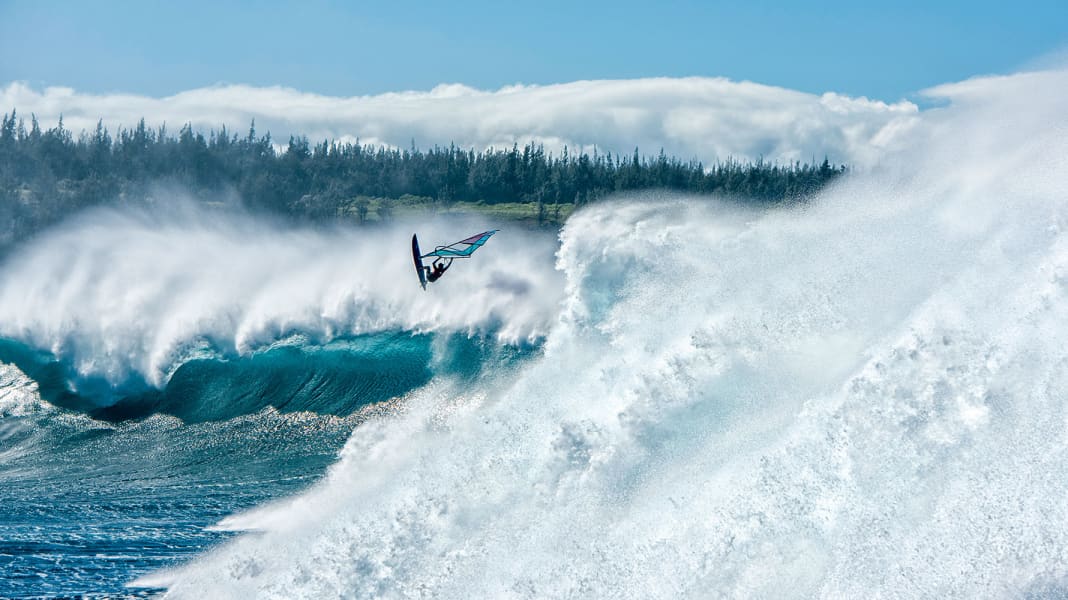
Jaws is a very special place for me - and probably for all other surfers and windsurfers who are interested in big waves. It is the pinnacle of big wave surfing and windsurfing. The wave on the north coast of Maui is probably the most famous big wave spot and definitely one of the most beautiful waves in the world. The place has a mystical aura to me - and everyone who has ever seen it. Every child who surfs on Maui grows up with the dream of surfing there one day. I was no different. I remember looking at the photos of Robby Naish, Jason Polakow, Björn Dunkerbeck and Josh Stone in the "Riding Mountains" photo series. I was about twelve years old at the time and dreamed of doing it all one day.

When I came to Maui when I was 15, of course I thought about it all the time. Back then, Josh Stone and Jason Polakow were my mentors. Josh wisely told me that you have to be comfortable crashing and getting washed in over mast-high waves at Hookipa. You're only ready to go to Jaws when you're no longer fazed by it. I took this advice to heart and began to prepare myself. However, before I went windsurfing at Jaws for the first time, I was able to surf tow-in with the surfer there in 2002 - I was just 18 years old. I even managed to get my photo into the coveted Surfing Jaws calendar. You can still buy it at Mana Foods in Paia, so my children are often proud when they see their dad in it.
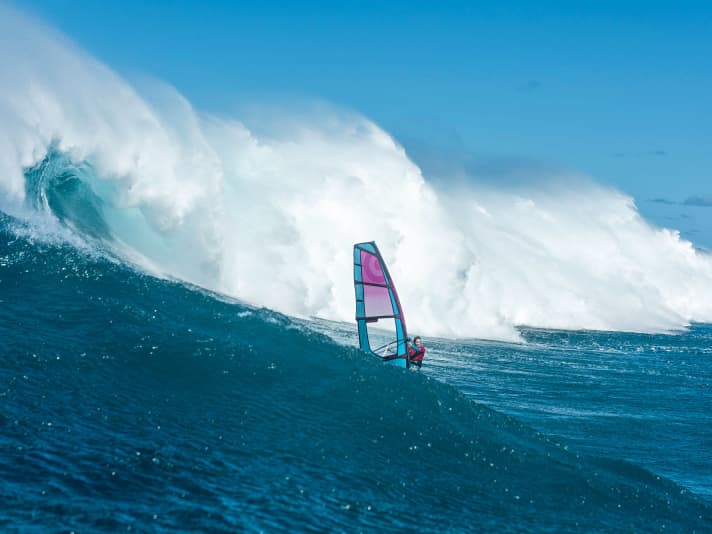
I wouldn't call big wave surfing at Jaws a complete obsession, as I'm busy with other types of windsurfing and surfing throughout the summer. But when winter comes, it definitely dominates my thoughts. I want to feel comfortable when I go there - so I start training long before the first wave ride, usually in September. I need to be able to hold my breath for three minutes or more without any problems. At that time, I also prepare our jet ski and bring it up to scratch. We're always really excited before the first big winter swell arrives.
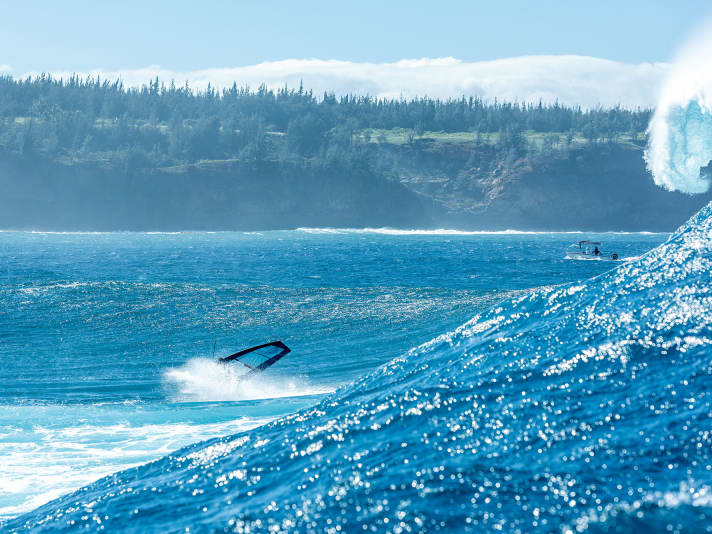
Through years of experience and constant preparation, I have become more and more comfortable in Jaws over the years. But I wouldn't say that the fear and apprehension of a big day has vanished into thin air. The last day we were out there again, for example, I surfed for four and a half hours and I don't think my heart rate dropped below 130 for the entire session. Normally when I'm out in Hookipa waiting for a wave, my heart rate goes down to 95 or 100 beats. The peak at the end of a wave ride is always well over 170.
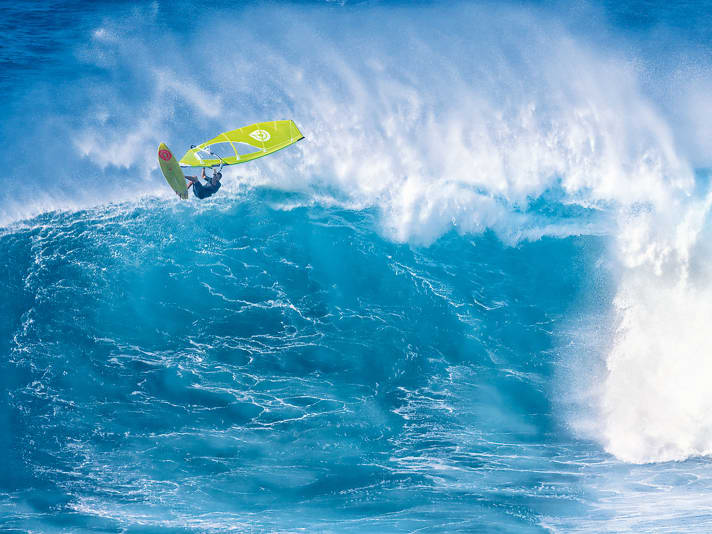
My first windsurfing session at Jaws was a bit disappointing after getting some epic waves while tow surfing there. Catching the wave was much harder than I could have imagined. I only managed to ride three or four waves. When the waves roll in from the west and the wind is extremely offshore, you're pretty much screwed without the right equipment. Back then, we always ordered longer boards with a relatively high weight: they were quite narrow, I think, 54 centimetres wide and 260 centimetres long. I definitely wasn't as well prepared as I am today, for example in terms of holding my breath. But I was only 18 years old and didn't have any children yet, so I was a bit more radical back then, I didn't really care.
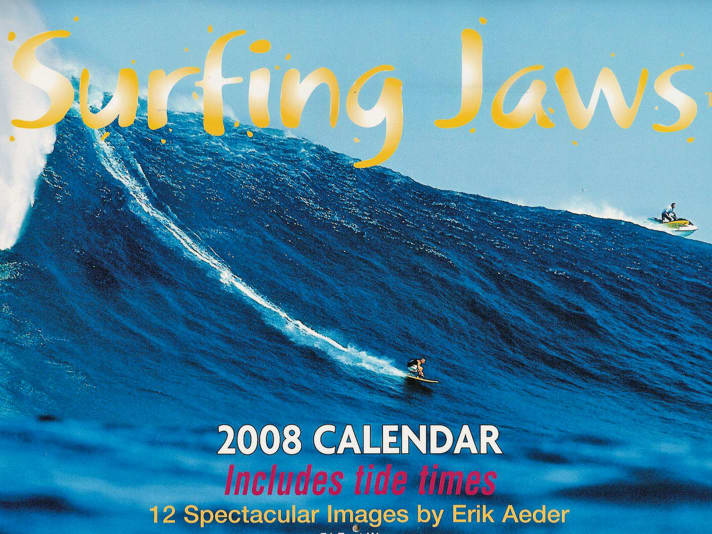
Over the years, we had a lot of mishaps because the jet skis were not properly moored - I have since learnt to tie very nice knots - when the anchors were not properly attached to the seabed. We practised that too. So we lost a few jet skis on the rocks. Fortunately not my own, but those of the people I was travelling with. At the wise age of 37, I've become much more cautious and try to prepare everything well before I set off.
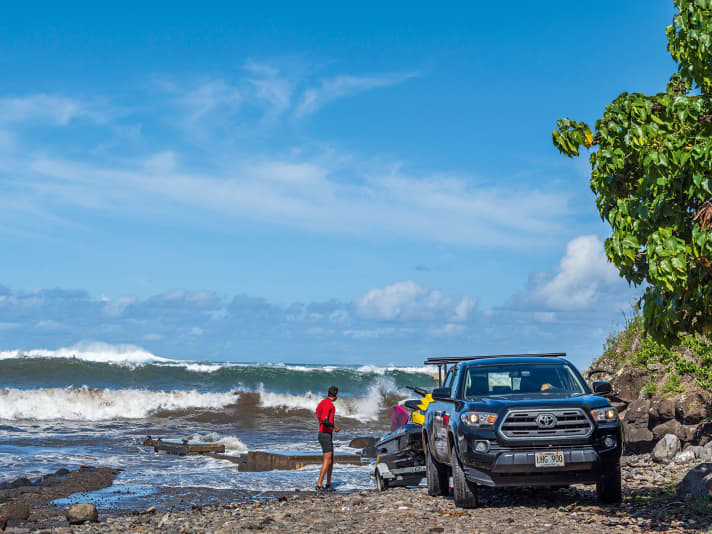
Having surfed up there on the north coast for 20 years now, I've had plenty of time to look at my waves and analyse what I could be doing better. Obviously Brawzinho is the man to watch at Jaws. When he attacks the lip of the wave, it looks completely surreal when you see him up close. No photo or video can do it justice.
I think that windsurfing is the absolute best way to surf Jaws - in terms of turns. And I always want to improve in that area. It inevitably puts you in situations where you have to do an aerial to avoid the destructive forces you've put in your way.
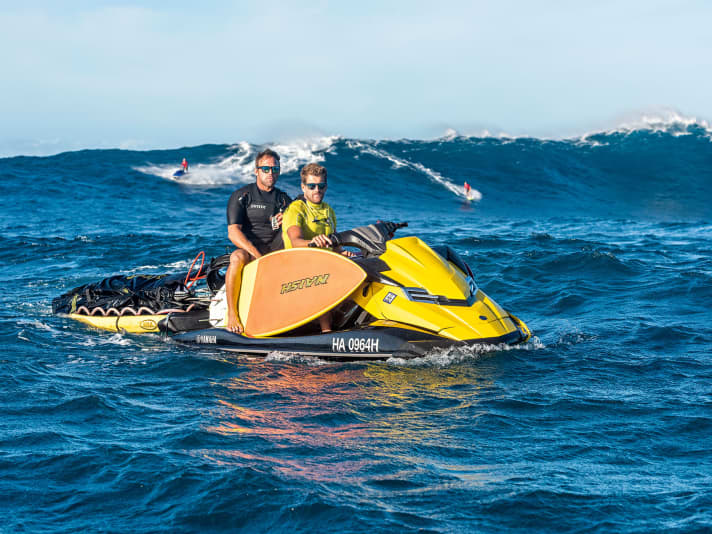
I look at the videos of me surfing there before I go out and visualise where I want to position myself on the wave - always much deeper than I think I should be! Deeper, in the case of Jaws, means setting your wave ride beyond the part where the wave starts to break. It's so deceptive when you're actually on the wave. Because it feels like you're miles too deep and will never make it round the breaking part unscathed. But the fact is that the wave goes around in a big curve in a horseshoe shape and the peak grows exponentially - which means that you can be much deeper than you think on almost any wave. However, it takes years of experience to convince yourself that it's okay to get that deep into the waves. Because it's so insanely scary.
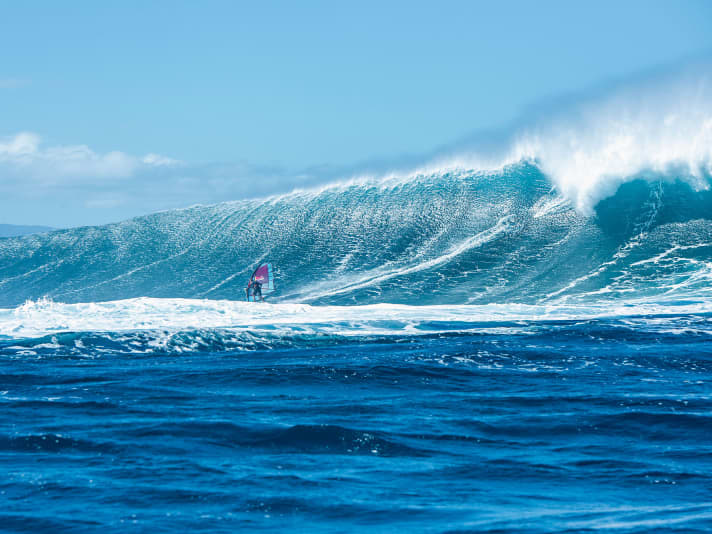
As far as the material design is concerned, I used a new prototype for the Ultimate Wave series board during the last session. It has a volume of 88 litres, is 59 centimetres wide and 222 centimetres long. - 38 centimetres shorter than my old Jaws boards. I think the performance of the new boards with the wider outlines and concave in the bottom is really suited to big waves, so you can get away with less length. The extra width allows you to get planing early and catch the waves without needing such a long rail line. And the shape in the underwater hull helps you to dare to enter the turn at super high speeds. I only rode this board for one afternoon and the waves weren't as gigantic as in 2021, but I felt very comfortable.
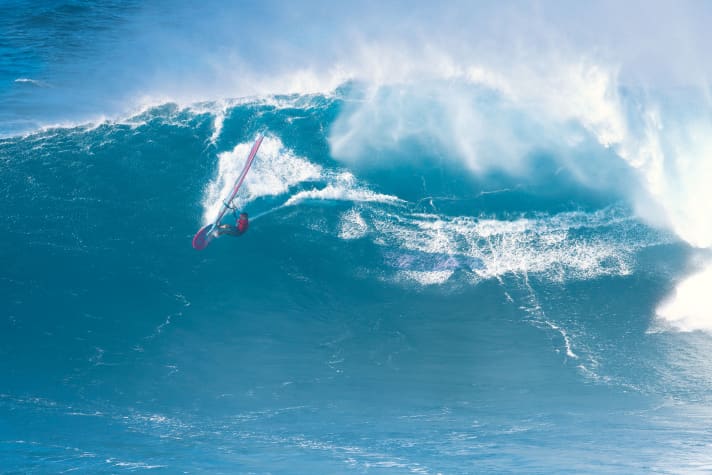
Jaws is a place where you only meet the really best people - everyone knows what they're doing, and that's a good thing. But the problem is that everyone is trying to get "the" photo for their social media, print magazines and sponsors, so it gets pretty hectic. There are rules about how close you can get to another on a jet ski when pulling a surfer into a wave. But these are completely ignored in Jaws. The guys sit much lower on their jet skis than you can on a windsurfer to catch the waves. Then they come to the other side of the wave and push you out of the wave with their jet skis. It's really dangerous and extremely scary. If you get pushed out of the back of a wave and a bigger wave comes behind it, you're completely wiped out. Because there's no wind behind the waves and there's no escape. Then there are the kiters, who can catch any wave miles out at sea, so they claim most of the waves for themselves and we windsurfers somehow get left behind.
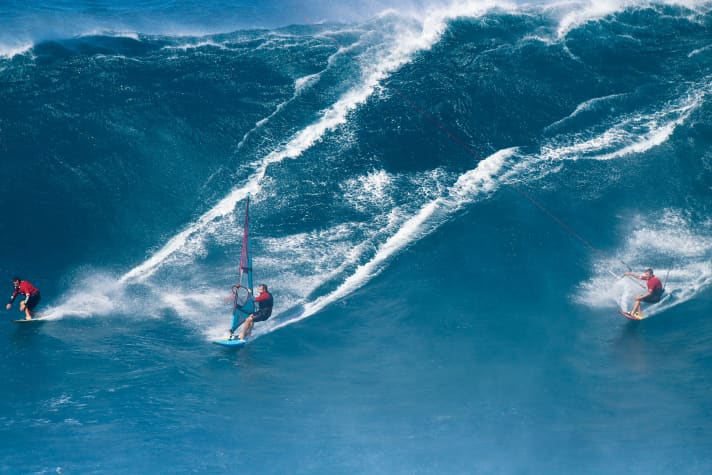
Luckily we know a lot of the really good guys who have etiquette in the water, and let the windsurfers go if they can catch a wave - as it's so hard to get one. The windsurfers definitely let the paddle surfers go first, which they should. And it would be really nice if the tow-in surfers always let the windsurfers go first. We'll see how the situation develops in the future. I understand that many pros' careers are made on the big days in Jaws, so there's a lot of energy - not always all good - in the water. But I'm still confident that people will behave properly. I believe in the good in people.
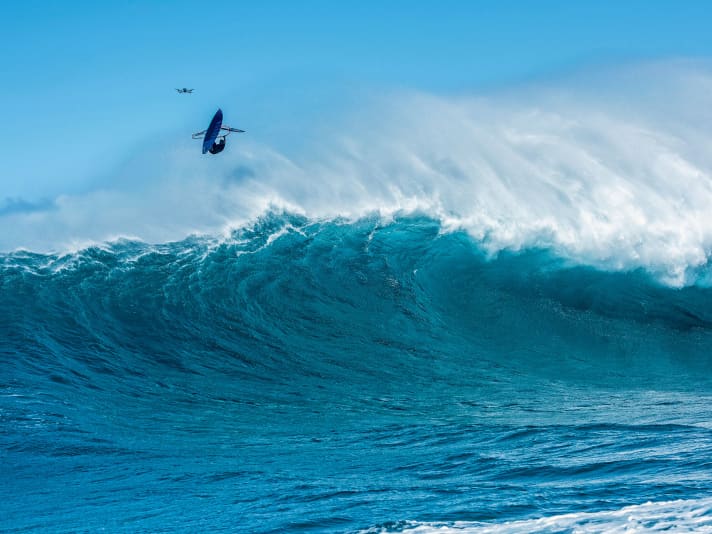
For safety reasons, we always hire someone to ride on a jet ski the whole time, watch us and make sure we're okay. One rescue driver is responsible for a maximum of three surfers. The Hawaiian Water Patrol - a professional safety crew made up of experienced and hardened Hawaiians - is always out there too, and it's great that they look after you. However, they are contractually obliged to look after certain surfers. So it's absolutely not okay to rely on them to come and help you, and you don't have a jet ski with you to back you up. Of course, the guys will always come and save you if it's a matter of life and death. But it's not fair to rely on someone else's rescue pilot and you only pay them when you need them, so to speak. There have been several cases where windsurfers have done just that and got into trouble. If you think about it logically, it's definitely not fair. You pay for the safety man as a kind of insurance that you hope you won't have to use. You shouldn't think that you can just take out the insurance if you need it one day.
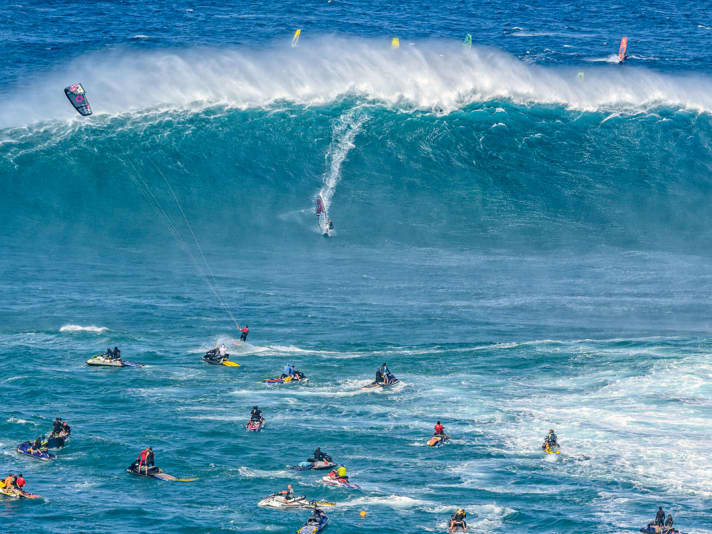
All in all, I think Jaws is the best big wave in the world for surfing or windsurfing. It's so perfect because it's quite predictable...
- and you can really go as far as you feel comfortable. You don't have to worry about all kinds of external factors, like in Nazaré in Portugal, for example, where the wave moves everywhere and there is no channel to avoid.
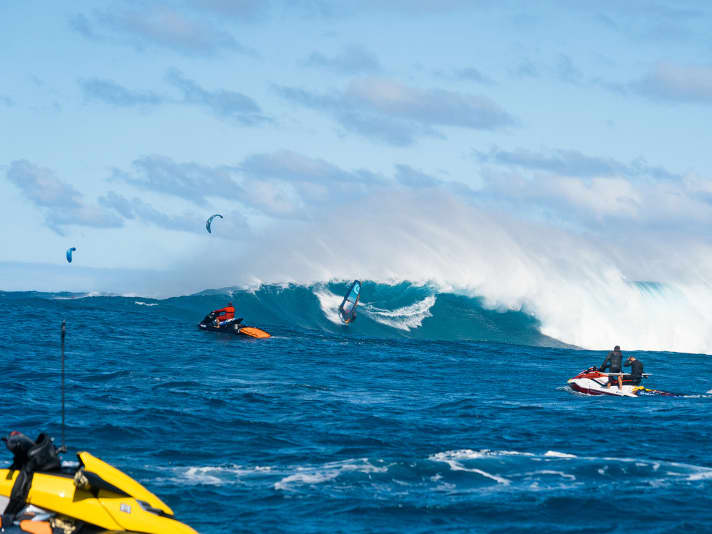
That says Wikipedia-> about Jaws
Further information in the Maui Guide Book->
